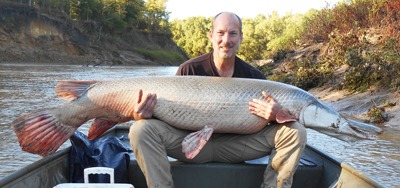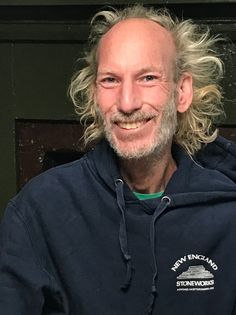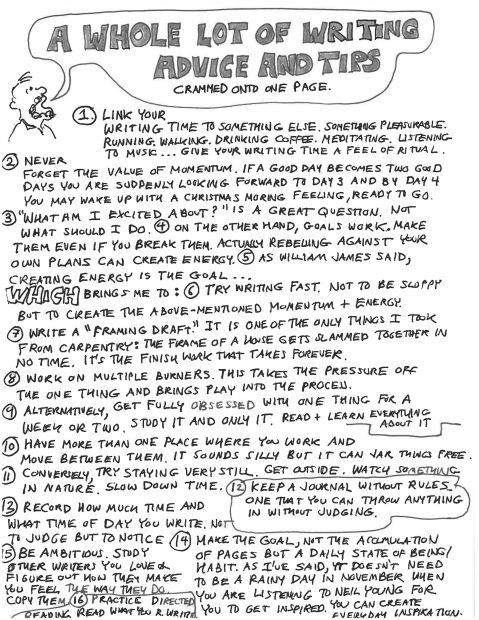Cocktail Hour
Mark Spitzer
categories: Cocktail Hour
comments: Comments Off on Mark Spitzer
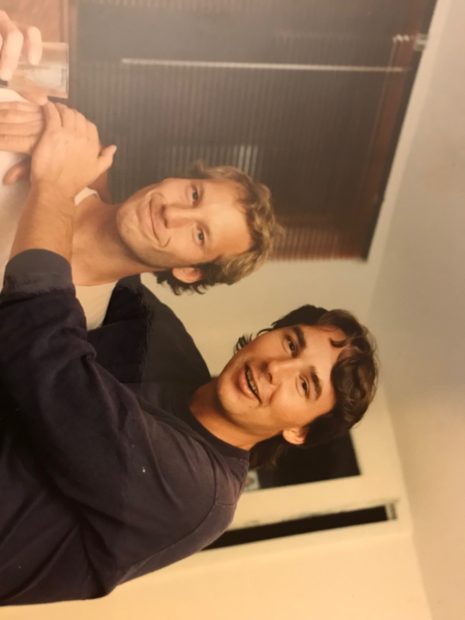 Mark is gone and the world is less wild, less joyous, less creative, less fun.
Mark is gone and the world is less wild, less joyous, less creative, less fun.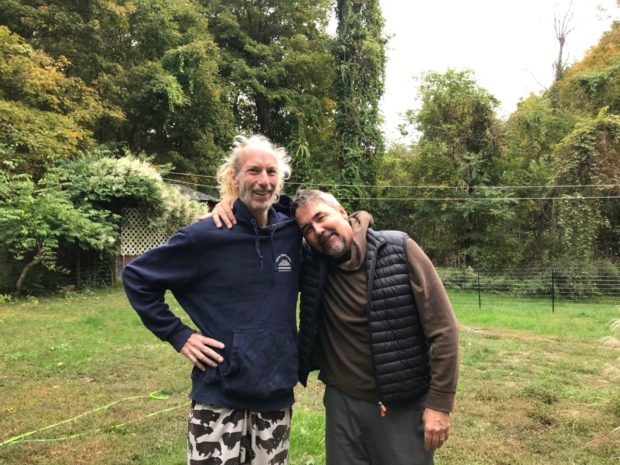
Writers for the Wild: Five Days in May
categories: Cocktail Hour
comments: Comments Off on Writers for the Wild: Five Days in May
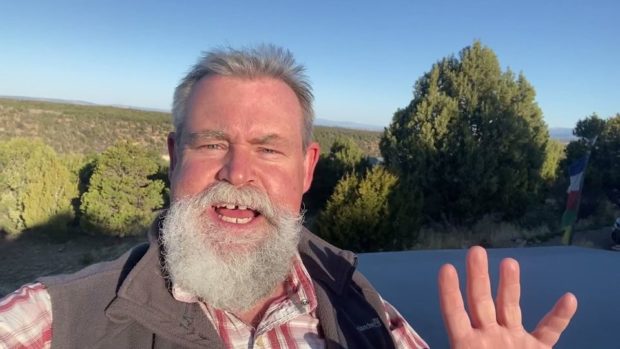
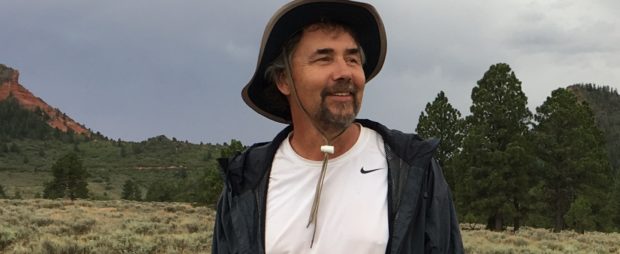
https://ranchlands.com/pages/writers-for-the-wild?fbclid=IwAR2aAPv62GCwVs5dgUdBmMeLAZJMV116VrgyNYa1-H0OmLEVgDtdj1Q2Hqo
A Daunting Time: 13 UNCW students on being the Class of December, 2020
categories: Cocktail Hour
comments: 1 comment

A Daunting Time: 13 UNCW students on being the Class of December, 2020
Intro by Nina de Gramont
What is it like to graduate into this broken world? What are the prospects for a future in a pandemic? These are the question my students and I have been asking in the Fall semester of 2020.
As a professor of creative writing at the University of North Carolina Wilmington, one of my favorite classes to teach is Senior Seminar, where graduating students complete their theses and write an analysis of the work they’ve done while in our BFA program. We also talk about career opportunities, how to apply to grad school, and how to continue a creative life when there are bills to pay. The class ends with a public reading of the students’ work, to which friends and family from all over the state – sometimes from all over the country – travel.
In usual times, much of the class is taken up with my exhortations to be brave. In one class a few years ago, I showed base jumping videos to highlight the value and excitement of risk. It’s a time in their life, I tell them, when taking risks is appropriate and necessary.
But these aren’t usual times. Instead of sitting together in a classroom, we’re a collection of tiny heads on Zoom. There’s no public reading to look forward to, or even a graduation ceremony. Taking risks isn’t what it used to be. How do we create excitement about venturing forth into a world that’s ground to a halt?
Covid-19 was an unforeseen event for the students who graduated last May. But our December graduates entered this semester knowing what it would look like. They gritted their teeth and faced it anyway. I asked each of them to write about Senior Year in the Time of Corona Virus. When I read their dispatches I knew this would be the year I didn’t need to tell my students to be brave. They had already told themselves.
Joe Bowling
I have to look at the funny side of graduating college during the COVID-19 pandemic. After all there’s only one other option, and that’s just grim.
I’ve been going to college off and on—definitely more the former than the latter—for the last ten years. I’ve quit many times before for many reasons, but there’s something about this semester that I just don’t want to let go of. I find it hilarious on a cosmic scale that I’ve finally decided to buckle down and get school done just in time for the universe to bring everything to a screeching halt.
With so much instability in the world, it’s nice to have something that I can control. If I take these five classes, show up on time, and do all of the assigned work, I will graduate in December. Whatever that looks like now. Even in dark, divisive political and social times like these, I have the chance to do something that no one in my immediate family did before me. At the same time, it’s a bit like life has handed us lemons and asked us to make lasagna.
This is a huge struggle for me, but I am aware it’s a huge struggle for all of us. I draw upon my military training to get myself through. I have the benefit of perspective. We unite through struggle. We bond together and bear the burden not as individuals, but as a single cohesive unit. We will come through the other side of this stronger than we would if things were still going according to plan. I know this final semester is going to be a roller coaster ride full of ups, downs, and de-railings. Those are just the facts. In the face of them, I’ve made the conscious decision to carry on. To lift up my classmates when they’re down. And, most importantly, to step out of the grim reality of the pandemic and take some time to laugh—even if it’s just to keep from crying.
Jules Miller
It wasn’t meant to be like this, but graduating during COVID is exactly how you think it would be. Uncertainty does not begin to explain the depth of my feelings. I am missing people—people who were supposed to be at my graduation. It’s like making a fancy sandwich and biting into it only to get a mouthful of stale bread that, to top it all off, was secretly stowing mold inside. No meat, no cheese, no vegetables. Just mold and the ghost of what bread used to taste like.
The Zoom calls have backed everyone into a quiet corner of politeness, afraid their voice might break audibly into someone else’s. We cannot overlap anymore. It is not the education I knew; it is not the education anyone expected when they entered this program with hopes of graduating on time.
It is, though, a different kind of normal. Private message chats between peers bring them closer without risk. Are we paying attention in class? No. Our brains are beyond it at this point. We crave connection and touch, and we hope another person will be there—will not be missing. We yearn for the end of this. We long to be unafraid to interrupt again. To overlap. To be heard. And we wait together.
Saifey Maynor
My life didn’t really begin till March. When quarantine started my boyfriend, who was visiting for spring break, got stuck here. We’d talked about cohabitation before and decided we weren’t ready for it, but when we realized that this all was never going to end he moved in. Having his support means not relying on my grandparents as much, which is great, but it also means I don’t really get the feeling of entering a new phase of my life that graduation is supposed to bring. It’s not like my personality is any less based around my grades than it always has been, but having another person sharing my bed has really put everything in perspective. There’s a man in my apartment and y’all want me to care about the world outside? Nope. People drive themselves crazy by caring about real shit right now, and I’m already crazy. I’m not falling for that.
I’m staying in the same apartment come spring, so it’s not like the landscape is changing. The only thing I’m losing is the ceremony, and I was not looking forward to the ceremony. I killed myself to keep my GPA such that I’d graduate with honors, and the stress of knowing I’d hear “cum laude” instead of “(x) cum laude” was making me want to kill myself again. Now, nobody knows my GPA is between a 3.5 and a 3.7 and none of y’all know me, so none of y’all care!
I’m still not “in” the “workforce,” I still don’t use subject lines in emails, I still don’t have an instagram or twitter or whatever young professionals are doing now. But I do have a man in my apartment. And I don’t have to cope with being an undergrad anymore. Think on that.
Kayla Benson
The smell of a fresh funnel cake at the county fair on a cool Autumn day. The feeling of shoulders brushing against one another at a crowded concert on a starry Summer night. The sound of sneakers squeaking on the floor of a polished college gymnasium. The taste of a perfectly cooked steak while catching up with old friends at a busy restaurant. The sight of returning students greeting one another with warm hugs and big smiles. I wish I could have known how much these miniscule moments would mean to me while I was living them.
I’m not going to lie and say I’ve dreamed of graduating college since I was a little girl. The most I’ve thought about graduation becoming a reality is in the Fall of 2020 when I realized what it will actually be like. There won’t be a building full of teary-eyed loved ones and soon-to-be alumni excited for the future. There won’t be big celebrations after a long list of names get called. No one will hug and take pictures as a group, or get to say their last goodbyes face to face. In the world we currently live in, graduation will mean sitting alone while names are announced through a tiny computer speaker. Our diplomas will come in the mail weeks later. The darkness of a screen and the close of a laptop will represent four years of college completed. This is as good as it gets. At least, for now.
Chris Dixon
It feels daunting to be graduating in Winter 2020 but I’m still looking forward to it. I’ve been in college since 2010 and I simply want to move on with my life. I’ve had to deal with red tape, bad teachers, and personal struggles just to get to this point. I’m happy to be finally done with college so I can move on to the next chapter.
I dropped out of college for three years and gave up on ever being where I am now. Graduating felt like a pipe dream and I thought I should move on and get used to staying in my hometown. Eventually I got out of a dark place and got my life together on my own. I have been taking care of myself in spite of my many personal problems. I can’t stress how good it feels to be this close to graduating with everything I’ve gone through to get here. It’s not a dream anymore.
Yes, I know things are bad right now, and there’s not much I can do about it so, I won’t stress myself out over things I can’t control. I’ve seen a lot of bleak, depressing, borderline nihilistic opinions that everything is bad and isn’t going to improve and I don’t find that outlook to be helpful in an already bad situation. I’d rather take what comforts and good news I can and not let the world or news beat me down and put me in a negative state. It doesn’t feel good and it’s difficult to get out of.
Kaila Byram
Contrary to the popular belief, graduating during a pandemic is exciting! What could be better than wearing a blouse with sweatpants for a Zoom meeting? The pandemic is a great way to save money, save time, and get things done. Got fifteen minutes in between Zooms? Wash those dishes that have been sitting in the sink for two weeks. Need to catch up on laundry? You’ve got time, especially without driving that commute. Always wanted to move to Spain but couldn’t because there’s no work opportunities? Great. Well, actually, no. They won’t let Americans in now. Unsightly pimple on your upper lip? No worries! COVID has you covered! Just wear your prettiest mask and no one will know.
In all seriousness, this pandemic hasn’t been easy. I’ve had my ups and downs this year like everyone else but one thing I’m completely terrified of is not being able to get a job and support myself. I have $25,770.34 in student loan debt, a car payment, and other bills that need to be paid. I’m probably going to have to move in with my parents. The world is in a state of flux, just as my life will be when I graduate from college. The world is changing, and there’s nothing anyone can do to stop it. What choice do I have but to roll with the punches and grow with whatever this world is turning into?
Chadstity Copeland
It’s been a daunting time. I’ve been in a slump that heavily affected my mental health and it’s been a struggle to seriously focus on anything. Early on I had a bit of optimism, when I could mull over how things might improve by summer. Things didn’t improve, and as my final semester crawled closer, I decided to ignore the pandemic. Not to become oblivious, but not to let it dampen my mind.
I decided to pour my anxieties into what I loved most: reading, writing and music. I consumed so much K pop, rock, alternative/ nu metal and even American pop albums that it became a pseudo soundtrack for my creative writing. This music fueled me to write more and more about my own fictional worlds. Instead of lingering on the troubles of the real world, I turned toward an outlet that not only improved my mental health, but also made me fall in love with my creative work again. This pandemic made me reflect on how I’m in charge of my creativity, and with graduation on the horizon, it gives me reassurance that I’m in charge of my own destiny too.
Jessika Hicks
Although I don’t know anyone who’s had COVID-19, this virus alters my life every day. Despite the isolation I know I am not alone. This pandemic is leading the future in a new direction.
I haven’t had a normal school year since I transferred to UNC Wilmington. First, hurricane Florence devastated our school. I was forced to stay home in Charlotte for a month. The following year hurricane Dorian hit and the school issued a mandatory evacuation. I was so worried about how long Dorian would be last and how much destruction it would cause.
Dorian was nothing compared to Florence, but then came COVID-19. I spent most of my summer watching TikTok to try and distract myself. The videos made me laugh so hard I cried, but mostly, they inspired me. I saw so many people finding hobbies and passions and starting small businesses. My best friend chose to pursue a Masters degree; quarantine gave her the self-reflection and space to make this decision. I’m realizing the importance of slowing down and not pushing myself too hard. I started drawing again for the first time in years.
Now I’m back on campus, but it’s not the same. The increasing COVID clusters scare me. We’re all doing our best to wear masks and stay safe. I feel like my senior year has been stolen; all my classes are on Zoom and I miss interacting in person. With the current job market I’m scared I won’t find work in the career I want. It makes me anxious to see how COVID-19 shapes my future. I’m focusing on finding what and who makes me happy while trying to remain hopeful.
Will Robertson
I’d love to hear the clink of a glass with my classmates, but how are we supposed to truly cheers to graduation and all of our accomplishments six feet apart or over a virtual meeting? Usually, there are people to blame for the madness in our world, but we don’t have that. I’m forced to accept the reality that this world doesn’t work the way I thought it did—it’s subject to change and about as reliable as toilet paper sitting on the shelf when the virus was starting its engine.
All of us students at UNCW have had to be extremely adaptable these past years, dealing with fallen trees and cancelled classes because Wilmington seems to be a hurricane’s favorite spot. We’ve become accustomed to interruptions, but now are pushed to a limit that no meteorologist could have predicted. It takes time for our city to repair from storms, but it takes even more time for our world to get through a pandemic.
Especially in the Creative Writing program, I feel like we are a community—all trying to be the best writers we can be. The privilege of being on campus with my talented classmates has been, for the most part, taken away. I never would have imagined that my last semester would mean my eyes always fixed on a screen.
What keeps me optimistic is looking at this time in our lives as an international meditation, and hopefully, once everyone is safe again, we can go out into the world refreshed with an uncovered smile—healthy, inspired, and ready to share our minds with the world.
Kalya Greene
Graduating during a pandemic is surreal. The near constant terror from the first month has dulled into a general blanket of misery and fear. School feels ridiculous. Everything in me hangs heavy, but it seems that all anyone wants is normalcy. A smile and a job well done. It’s hard for me to summarize everything in my head when it comes to this topic. I am sad, anxious, afraid, but mostly tired.
I feel as if writing my true feelings will be perceived as negative. I have no “It will get better” or “We’ll get back to normal soon” for anybody. I’m graduating in December, and I don’t know how to feel about it. I don’t think I’ll notice until deep into January when I feel the absence of that unyielding structure that has been omnipresent in my life since grade school. All I have right now is hope that I’ll find a way to exist in this world, while I’m here.
Mel Newcity
I imagined my final semester very differently when I returned to college. At twenty, I had dropped out due to financial complications, and I worked full time in various offices until I could resume my courses part time. For five years, I slowly chipped away at my degree. As my younger classmates graduated, I watched with anticipation barely outmatching my envy. Surely, I thought, my labor would culminate into a celebration of patience, diligence, and perseverance. I imagined a thesis reading surrounded by friends and family, flowing robes, and a final product I could send off for publication.
Graduating during COVID means family and friends can’t travel. I have no desire to pick up my graduation gown. My thesis is as exhausted as I am. I cannot fully express my disappointment with the reality of my final semester during the pandemic. I can only depict today. This morning, I sit on the porch before my next virtual meeting, reflecting on the poets who’ve influenced me over the years. A pair of cardinals perches on a nearby telephone wire. The autumn breeze rolls in just as it did last year and the year before. My cat paws at the sliding door. Each moment brings about its own reason for commemoration. If I pare back my expectations, my final semester isn’t too far off from what I imagined. I may be tired, overwhelmed, and bouncing on the emotional spectrum, but I have my health, my pen, and reason to celebrate.
Sarah George
Being a college student during COVID is, in a word, difficult. I feel a bit as though I’ve been robbed of a truly comprehensive, full final semester here at the university I have grown to love. Not to mention the worry about a graduation ceremony (or the potential lack thereof). When quarantine began last March, I had no idea things would get this bad, and as it dragged on I became more and more depressed and unmotivated. Depression is something I struggle with anyway, so world events exacerbated it. While I was at home, I would just get up to eat and go to work, and the rest of the time I didn’t even feel like leaving my bed. At first I thought I could turn it into a good opportunity to get writing done, but I didn’t write hardly anything at all, which made me feel even more like a failure. I was completely miserable.
Once campus finally opened up this semester, coming back to UNCW helped my mental state considerably. I was able to get out a bit and see my dear friends again. COVID scares on campus were worrisome, but now it seems that we are on the right track and will finish just fine. Getting back to a routine has helped me get back to writing, too. So, really, I’m doing better every day. I can’t wait until this whole mess is just a bad chapter in a history book. I’ll be able to look back on it and be grateful for my close friends who helped me so much during all this. I feel as though graduation itself will be a blur; something considered only long after it’s over.
Kristen Dorsey
Years ago, when my high school friends headed to college, I got on a plane to Parris Island, South Carolina, to USMC boot camp. My four-year military tour had less to do with patriotism (although I am proud to have served) and more to do with 1980s Reagonomics: my family couldn’t afford to put four kids through college.
I don’t regret my service. I traveled overseas, got physically and emotionally strong, and learned skills that resulted in ten exciting years in the Intelligence field within the Department of Defense. The Marine Corps gave me the discipline needed to run my own business after I left the DoD.
In 2017, I took a risk: I moved to Wilmington, and enrolled at UNCW as a full-time student in the Creative Writing Department.
As I approach my later-in-life graduation, I seesaw back and forth between excitement and terror. I let go of everything I used to be at an age where many people find new beginnings—and that’s exciting.
However, like all my classmates, I’m joining a workforce where almost half the adult population is underemployed or unemployed. Add that to 2020 statistics from the National Bureau of Economic Research that found that workers over age forty are only about half as likely to get a job offer as younger workers.
Sometimes I lose my breath, thinking, “What have I done?” But writing, I’ve discovered, gives voice to my life experiences in a deeply satisfying way. There’s no going back, anyway, and while this is an unprecedented ordeal in our history, I’ve been through tougher times.
FIRE
categories: Cocktail Hour
comments: Comments Off on FIRE
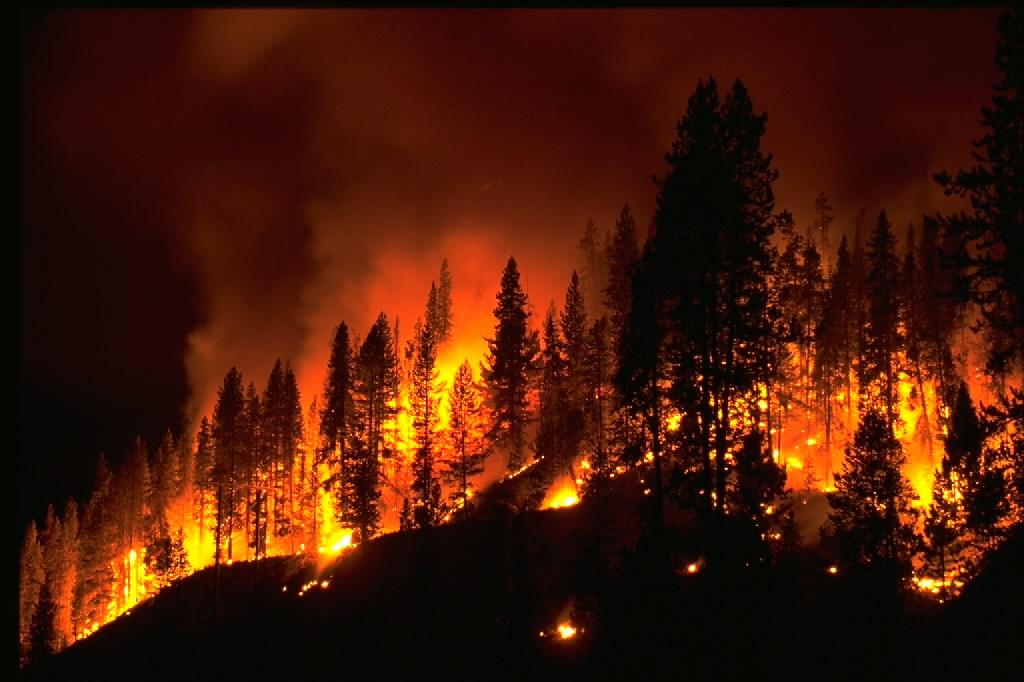
As the peak of hurricane season arrives, and seven tropical systems make their way across the Atlantic, I am thinking about big water. But I am also thinking about fire and my friends, and the land I love, in the West . This is an excerpt about western fires from All the Wild That Remains: Edward Abbey, Wallace Stegner and the American West:
After we cleared the plates, Elena volunteered her babysitting services, and Emily and I drove up into the foothills above Fort Collins to see the scars from the recent fires. The fires had just died down, after raging for a month, and would have ended up being the most costly fires in the state’s history were it not for the almost-simultaneous conflagration down in Colorado Springs. It was a summer for the history books with the Front Range ablaze and often blanketed in smoke.
We drove following the river up into the hills, but the river was so dry it seemed no more than a red stain of itself. Soon we were staring up at miles of charred ridgeline. In Soldier Canyon we saw an entire charcoal hillside of blackened trees, the spindly remains looking like black skeletons. Emily told me that the high winds had caused the fire to jump from tree to tree, at one point actually jumping the river. She related the story of an acquaintance who was carefully evacuating, knowing the fire was miles away, when suddenly his house was aflame.
We drove past the Rist Canyon Volunteer Fire Department and to another charred ridge of forest. Dark gnarled hands grasped at the sky. About seventy percent of the homes in the area had burned.
I asked Emily if I could get out of the car and walk up the ridge a bit. The land smelled of ash, the trees blackened. My footfall made a sibilant hiss as I moved through the crisp, ashen landscape. The ridge above looked like a porcupine’s back, the spikes consisting of black trees with only the slightest color from dead yellow foliage.
I knew that as historic and tragic as that summer’s fires were, there was a very good chance they were just a preview. I thought of the way that the fight to tell the truth, and to get westerners to see the facts about their land, ultimately wore Wallace Stegner down. It isn’t hard to see why. Stegner understood the necessity of hope, but in the end the facts painted a less than hopeful picture.
The facts have grown more depressing. Over the last decade the cost of fighting fires has gone from making up 14% to 50% of the Forest Service’s budget, and both firefighters and scientists tell us that we have entered a new era of fire in the American West. These recent fires, called “megafires” by some, are certainly exacerbated by climate change, but they are also aided by historic factors apart from rising temperatures and increased aridity. Primary among these is the long history of fire suppression in the West.
Fire suppression, of course, was supposed to be a good thing. Like the introduction of erosion-aiding tamarisk on the banks of western rivers, it was meant to help with an existing problem. In this case the problem was the “Big Blowout” fires that ravaged the west in 1910 and that gave weight to Bernard DeVoto’s idea that in the West catastrophe might destroy a whole region. Millions of acres were burned and the flames eventually ignited not just forests but the country’s imagination. Fire fighters became national heroes, and fighting fires, all fires, became the driving purpose, the idee fixee, of the Forest Service. But as often happens when we intrude on natural processes, this created a problem. It turned out that by suppressing fires, we stamped out even the smaller fires that had beneficially rid forests of excess fuel in the form of deadfall, scrub growth, and other organic debris. It is as if a giant had come along and arranged things perfectly in the fireplace of our forests, with plenty of kindling and paper below the big logs.
Finally, the trees have changed in another way. The changing climate is effectively turning the West into a powder keg by reducing snowpacks and lifting temperatures, with these extreme temperatures effectively sucking the moisture out of trunks and branches. This means that the trees are perfectly built for ignition, the wood so dry that they are always a spark away from burning. The result has been that in recent years we have had our own Big Blowouts, and have witnessed the largest and hottest fires that have ever been recorded in the West.
Over the last few decades the Forest Service and other organizations has begun to understand the combination of factors that aid these fires, and have tried to reduce the fuels that feed them by clearing the forests of excessive deadfall. Policies of fire suppression have also loosened, though in the current climate of understandable fear, there have been renewed cries for the old ways of stamping out every spark. Of course in places like this hillside the houses themselves help provide the fuel, going up like torches.
When I visited with him in Kentucky Wendell Berry urged me to consider land use as I explored the West. This meant understanding which places are fit for farming, for homes, for mining , for recreation. To begin, we must question some basic assumptions. In this summer of fires, one of those questions is simple enough: is it wise to build wooden homes, or any homes, near national forests or in the fire-prone foothills above mountain towns? Then there is a larger question of land-use, one unique, in our country at least, to the West. When you build a house in the western wilderness you are not building a cabin in the Berkshires. You are laying claim to land that is at once vulnerable to human incursion and often inherently risky to settle.
Homeowners will soon be re-building in these burnt hills, but, while they don’t want to hear it, there is little question that the land would be better off left alone. When people do build near forest land, they wisely fear the slightest sign of fire. Which means that they have little tolerance for even small blazes, those beneficial blazes that have been a historic part of the cycles of western forests. And more people always means one more thing: a greater chance of sparking a fire.
Throughout the West, the human population will increase, that is a given. But even as it does we had better keep in mind the particulars of the place. There are landscapes in the West that are naturally ornery, that ask, in all but words, to be left alone. More specifically, what the land here asks for is a clustered population with large buffers where there are no humans at all. To our credit we have done just that, as a people, in establishing parks and national monuments and forests and other public lands. But as more of us crowd in, and put more demands on this land and its water, and as more people attempt to pry away protected land and “put it to use,” we had better remind ourselves of why large sections must remain free of human intrusion.
If parts of these western lands are really as vulnerable and difficult to inhabit as Stegner and others have suggested, as open to disaster, then perhaps to leave them alone is simply practical. We don’t put land aside only because it makes for a pretty park. We put it aside because it makes sense. It is how it should be. Much of this land is properly wild.
* **
From a passage earlier the book from my visit to Boulder:
We reached the Flagstaff summit and took the bikes off the back of my car. Though it was the summit of that particular mountain, there was plenty of up left. We pedaled the steep section above the summit that we used to call “Old Bill.” Rob seemed to get some slight sadistic pleasure in seeing me gasping for air like a landed fish. I made it to the top, just barely, and only after Chris pedaled up and shouted encouragement, finally pushing my bike from behind during the steepest section.
After we reached the top we rode down the mountain’s other side so we could get a good look at the area that had burned. A charred ridgeline greeted us. Chris told me that all June Boulderites had stared up at the smoke, praying that winds wouldn’t blow toward town.
“It’s so dry that the mountain houses would be like kindling,” Rob said.
Of course what went unsaid is that Boulder had been lucky, at least compared to other front range towns. Less than two weeks before, the Waldo Canyon fire in Colorado Springs had leapt over two lines of containment to torch houses in the city proper. It became the most destructive fire in the state’s history, its 350 homes destroyed passing the record of 259, a record just set only days before by the High Park fire in Fort Collins. A decade earlier when Colorado experienced a similar if less destructive fire season, those in the fire-fighting community were skeptical of the role that climate change played in the fires. No longer. With record temperatures and light snowpack the fire season now regularly starts almost two months earlier than it did just a decade ago. A century of fire suppression has led to forests unpurged by smaller fires, and therefore packed with deadfall and groundcover that helps light up the drought-dried wood like torches. And with more people building houses in fire prone areas there is plenty of added fuel. I couldn’t help but be reminded of the trophy homes that line the beaches in the Outer Banks in coastal North Carolina, houses that have been set up like bowling pins to be knocked down by the next hurricane. In both places it is most often the wealthy who build homes that are endangered, and frequently these are second homes. I thought of how, back in Carolina, summer is always an anxious time, with people awaiting the beginning of hurricane season. Here they awaited fire. There was also another similarity. The same fervent belief in rebuilding infects both the homeowners who have seen their homes burned down and those who have seen theirs slammed by the sea.
“Re-build!” they all shout. But there are other voices, too, and more than there used to be, voices that suggest that perhaps it would be better not to re-build. You could argue that, with the embers barely cooled and whole towns engulfed in tragedy, this wasn’t the right moment to question the wisdom of re-building in the dry Colorado hills. Or maybe it was the exact right moment. In the fervor after a disaster there is always talk first of loss, then of hope and re-building. What there is not a lot of is cold-eyed clarity.
Which is where DeVoto and Stegner help. In this burning summer, these two dead writers couldn’t be more alive. In a time of drought and fires it is hard not to return to their central contention: that this land that we are treating like the land of any other region is in fact quite different, a near desert, and that its life depends on that not-always-reliable snowpack. Much more reliable are the cycles of drought, which have been a part of the West forever. As it happens we are now in the midst of one of those cycles. It would be wise to acknowledge this and deal accordingly.
What would that mean? For starters, acknowledging that there is a reason that the West has always been relatively unpeopled. Large stretches of it are simply not fit for human habitation. The booster says, “Well, let’s make them fit!” The Stegnerian realist says, “Well, maybe we shouldn’t live there.” Don’t move to a place where your houses are likely to serve as kindling. There are some places that are better left alone.
But what’s the point of saying this now, when the houses are already built and when those burned will surely be re-built, the genie already out of the bottle? Because we are at this moment seeing many of the things that Stegner and DeVoto warned about coming home to roost. And because even if warnings are not heeded, they still must be given.
Stegner understood well the necessity of hope, but in the end knew that cold-eyed clarity was more important. Today cold-eyed clarity tells us this: the world is warming and some of the places that the world is least ready to adapt to that warming are places that are already, as Stegner called them, “subhumid and arid lands.” In a place already on the edge, a slight tip puts you over. In a place where drought is already commonplace, more heat and less rain are killers.
The majority of climatologists believe that, along with low-lying coastal areas, it will be the water-stressed areas of the world that will be most affected by climate change. At first this sounds simple to the point of being a tautology. It isn’t. They are not merely saying that the dry places will be hardest hit. They are saying that the driest places, like the American Southwest, will change the most compared to their baseline. And how will they change? The predictions are consistent. Drought is by definition an anomalous word, but what we now call drought will become the norm. And with that as a new baseline, the droughts will be of a sort the region hasn’t seen since the Middle Ages, when so-called megadroughts drove the Puebloan people from the region.
For Wallace Stegner, real knowledge of a place, and science, trumped myth. And what science is now telling us is straightforward: that a place that historically had little water will have less.
T.R. vs. Trump: A Cartoon Essay
categories: Cocktail Hour
comments: Comments Off on T.R. vs. Trump: A Cartoon Essay

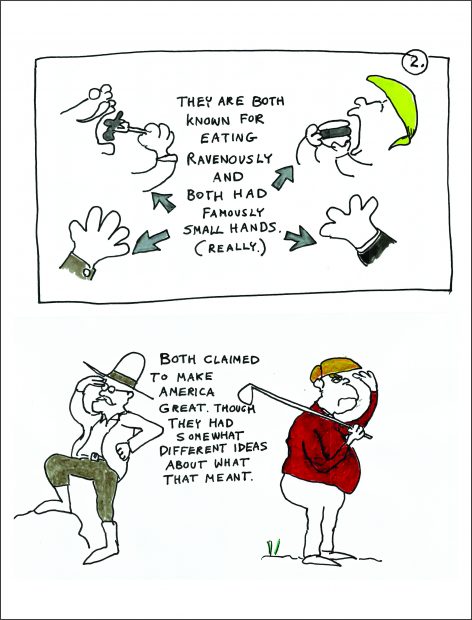
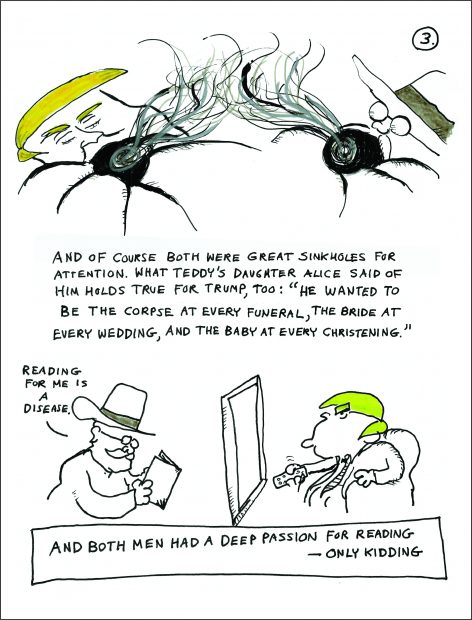
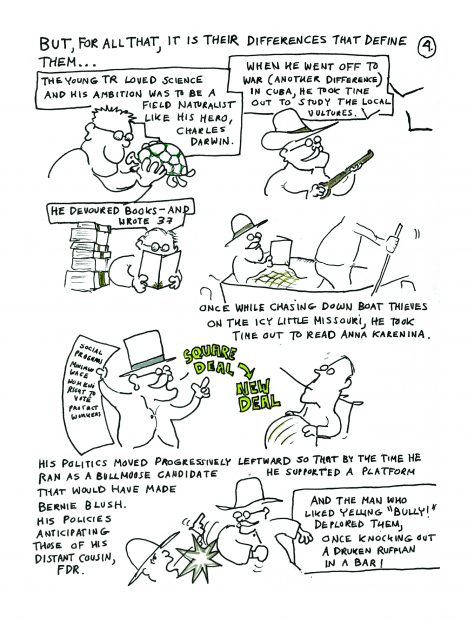

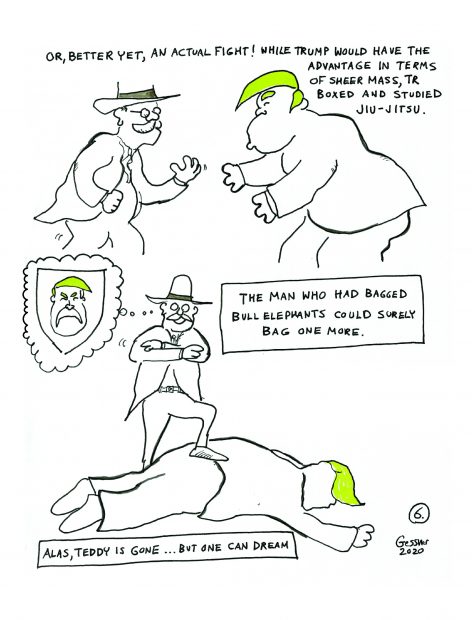
Trump vs. TR: The Big Fight
categories: Cocktail Hour
comments: Comments Off on Trump vs. TR: The Big Fight
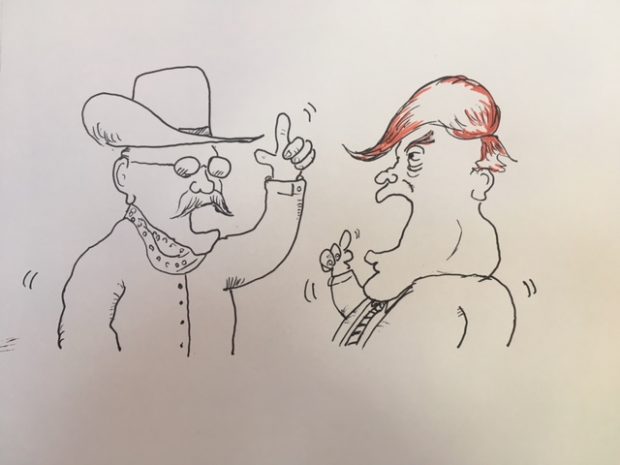
Shack as Metaphor
categories: Cocktail Hour
comments: Comments Off on Shack as Metaphor
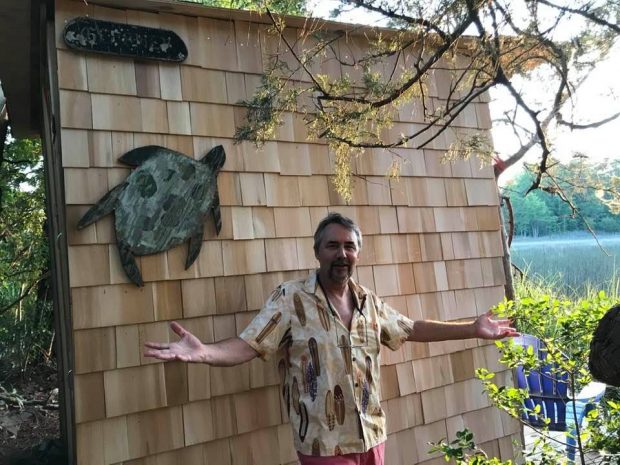
For a pretty humble building, the shack has done a lot of metaphoric lifting for me over the last few years. Tonight, as the storm approaches, I am thinking about it as a stand-in for all the writing the world doesn’t see. “Four fifths of his productive iceberg was under water,” Wallace Stegner wrote in The Uneasy Chair, his biography of Bernard DeVoto. With Thoreau that might have been closer to nine tenths, maybe more. If we define “under water” as writing unseen by the public and we reason, not unreasonably, that had Thoreau’s reputation not been revived, somewhat miraculously, the journal would have been left unread, maybe we are talking closer to 99/100ths. This is something non-writers don’t understand. The real work is not always the work the public sees. The real work goes on daily, unseen, unappreciated. Which doesn’t make writers special. It makes their profession similar, in this way at least, to every other.
So back to the shack. I’ve spent the last 8 months re-building it, shingling it, fixing it up, making it so that it looks completely unlike its truly shack-like predecessor. “A fancy little house,” Nina calls it. But this fancy house is still at sea level and basically in the marsh. And now another storm has taken aim at us. Hence the shack as writing metaphor. All that work. For what?
Not for naught, I would say. I’ve poured time into it and not a little money (cedar shingles are expensive), but I’ve also gotten a lot out of it. Absorbed hours of work and problem-solving. Good chunks of time when I was worried, not about my own troubles, and not focused inward on my own neuroses, but outward into a project that fills up my hard-to-fill mind. I don’t need to say “Just like writing,” do I? You get it. Well more than half the pleasure of it, whatever the worldly results, is in the doing of the thing. The fact that wind may now come and blow my little house down is incidental. In fact, in the long run, it may be advantageous. That way I can build the shack again. How could I get so lucky?
Talking with Teddy
categories: Cocktail Hour
comments: Comments Off on Talking with Teddy
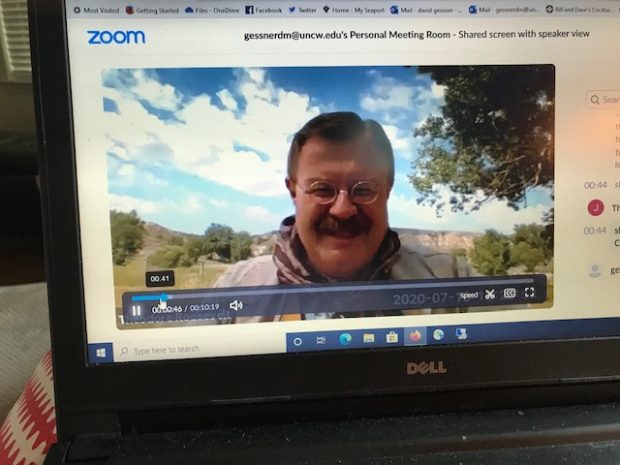
Here is our conversation:
Deep
categories: Cocktail Hour
comments: Comments Off on Deep
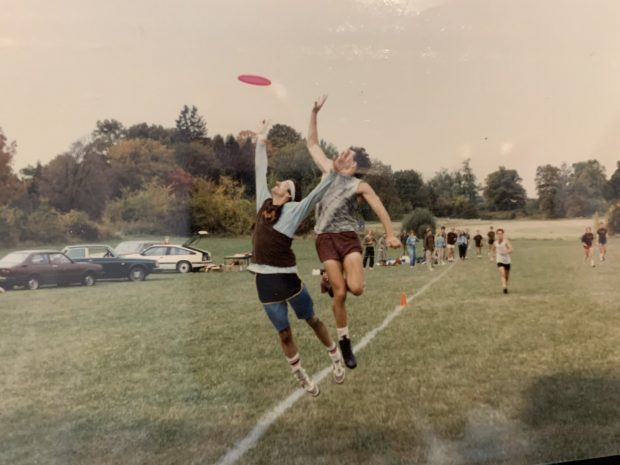
From Ultimate Glory:
If my throws could be erratic, there were things I could trust. Jumping and catching a disk was something I knew I did well and no one could tell me otherwise. I always felt that anything up in the air was mine. Felt that I could go up and get it and do so in the most direct way possible (which may have occasionally involved collisions with other players). A direct line from what I wanted to what I got, so unlike the other areas in my life. I had read my transcendentalists in college and what was this if not transcendent? The moment of leaving the ground—leaving the earth behind! The unthinking moment. Of uncertainty, of risk and reward.
The best I felt during those early years was when I was deep in the Hostage zone. As the deep, I played a kind of centerfield position, hanging back and guarding against the other team’s attempts to huck. For once in my young life, I was in command, standing back there, daring the other team to throw, even baiting them to throw. Certainly there were taller players and better jumpers, but I defended my turf with rapacity. It was my responsibility after all. Other people—other Hostages—were depending on me.
Since I was behind everyone else on defense, my position also served as a kind of command center where I could yell and tell other Hostages where to go. I loved the feeling of mastery, of seeing the whole field and moving my teammates around like chess pieces. The deep in the zone is very much an individual position—and that suited me—but just as important as being an individual was the feeling that I was part of something. When we were playing really well it was as if we were all part of a vast network or nervous system, connected not just verbally but synaptically. I could yell to Neal to dive right and suddenly he had a block or Jimmy, at side middle, could warn me that someone was running deep on my off side. At our best we were like one connected whole, a single being.

